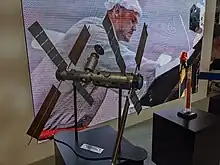List of commercial space stations
This is a list of current and planned commercial space stations.
Current
While commercial space flights have been flown to the International Space Station, there are currently no commercial space stations in operation.
Canceled
Bigelow Aerospace space station
Bigelow Aerospace proposed an expandable space station for commercial use. Air will be pumped into the station to inflate it once each piece is in orbit.
Northrop Grumman

In December 2021, Northrop Grumman signed a Space Act Agreement with NASA under the Commercial Low-Earth Orbit Development program for $125.6 million to design a commercial free-flying space station in low Earth orbit (LEO).[1] Northrop Grumman has a web page describing their "vision for space-as-a-service" which "focuses on delivering an accessible, full-service commercial space station in Low-Earth Orbit (LEO) that will continue the work of the International Space Station (ISS), while expanding across multiple markets to provide optimized and tailored support for a new commercial economy." Northrop Grumman is partnering with Rhodium Scientific on bio-tech and bio-pharma research in low-earth orbit.
Planned
Axiom Segment/Axiom Space Station
Axiom Orbital Segment or Axiom Segment are the planned components of the International Space Station (ISS) designed by Axiom Space for commercial space activities and space tourism uses. Axiom Space gained initial NASA approval for the venture in January 2020. This orbital segment is planned to be separated from the ISS to become a separate space station, Axiom Station. It is unsure what launch vehicles will be used to launch these modules.
Up to three Axiom modules could attach to the International Space Station. The first module could be launched in 2024 and would dock to the forward port of Harmony, requiring relocation of Pressurized Mating Adapter (PMA-2) to any other ports on ISS like Harmony nadir. Axiom Space plans to attach up to two additional modules to its first core module, and send private astronauts to inhabit the modules.[2]
Axiom renderings illustrate how the three modules might attach to the ISS as they are berthed and relocated by the Mobile Servicing System using Canadarm2. Canadarm2 might also continue its operations on the Axiom Space Station after the retirement of ISS in the early 2030s.[3][4]
Orbital Reef
On October 25, 2021, Blue Origin announced that together with Sierra Space it would build a 'Mixed-use space business park' in LEO called Orbital Reef, to 'open multiple new markets in space, [and] provide anyone with the opportunity to establish their own address on orbit. [..it] will offer research, industrial, international, and commercial customers the cost competitive end-to-end services they need including space transportation and logistics, space habitation, equipment accommodation, and operations including onboard crew. The station will start operating in the second half of this decade..'[5] Further partners are Boeing, Redwire Space, Genesis Engineering Solutions, and Arizona State University.[6]
Starlab
Starlab is the name given to the planned LEO space station designed by Nanoracks for commercial space activities uses.
The company released preliminary plans in October 2021, where the main structure of Starlab consisted of a large inflatable habitat to be built by Lockheed Martin and a metallic docking node. In 2023, the design changed to a metallic structure with Airbus Space as the main partner.[7]
The station is being designed to support 4 persons in 340 m3 of volume. The station also features a 60 kW power and propulsion element, a large robotic arm for servicing cargo and external payloads. The station is supposed to be operational in 2028. The company has partnered with other companies to realise the project:[8]
- Nanoracks: Nanoracks owns and operates Starlab and GWC Science Park.
- Voyager Space: Voyager, the majority stakeholder in Nanoracks;
- Lockheed Martin: Lockheed Martin builds spacecraft systems. The company serves as the technical integrator for Starlab and will develop Starlab's inflatable habitat module. After launch, Lockheed Martin will operate the system under Nanoracks' leadership.
Haven-1
In May 2023, Vast announced that they had purchased a SpaceX Falcon 9 launch for the Haven-1 space station, targeted for launch as early as August 2025.[9]
Pioneer Space Station
Above: Space Development Corporation proposed two space station, both are rotating wheel space stations. The Pioneer Space Station is the smallest[10] and will be launch in 2025.
Voyager Space Station
Above: Space Development Corporation aims to launch the Voyager Space Station in 2026.
See also
References
- "Northrop Grumman Signs Agreement with NASA to Design Space Station for Low Earth Orbit". Northrop Grumman Newsroom. Retrieved 23 January 2023.
- "NASA selects Axiom Space to build commercial space station module". SpaceNews. 28 January 2020. Retrieved 14 February 2020.
- "Assembly Sequence: Watch the Axiom Segment of the ISS constructed module-by-module". Axiom Space. Retrieved 12 June 2020.
- "A Private Space Station Might Be Born From the ISS". seeker.com. Retrieved 26 September 2021.
- "Blue Origin and Sierra Space developing commercial space station".
- "Home". orbitalreef.com.
- https://www.reuters.com/technology/space/voyager-space-airbus-deepen-tie-up-new-space-station-2023-08-02/
- "Starlab". Nanoracks.
- "A start-up teams with SpaceX to be first to orbit a commercial space station". The Washington Post. Retrieved 17 July 2023.
- "Pioneer Station". abovespace.com.